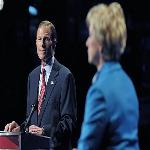05 October 2010

Photo: AP
Democratic candidate for US Senate Richard Blumenthal, left, and Republican candidate for US Senate Linda McMahon debate in Hartford, Conn., 04 Oct 2010
Recent public opinion surveys suggest that Democrats might be narrowing the gap with Republicans in the battle for control of Congress in the November 2 midterm elections.
The latest poll from The Washington Post and ABC News shows Republicans leading Democrats by a margin of 49 to 43 percent among likely voters. Other surveys show the parties effectively tied. It was only a month ago that Democrats trailed on that question by 10 points in several surveys, and the improvement suggests that Democrats are having some success in energizing their core supporters to vote in the election.
Presidential pull
The tightening in some polls might be due in part to stepped-up efforts by President Barack Obama to rally his supporters, especially younger people and minorities who turned out in huge numbers to support him in the presidential election two years ago.
"Now is not the time to lose heart," said President Obama. "Now is not the time to give up. We do not quit. And we cannot forget that this nation has been through far worse and we have come out stronger from war to depression to the great struggle for equal rights and civil rights. We do not quit!"
There are also signs of a Democratic comeback in the area of campaign fundraising. The Democratic National Committee raised $16 million for their House and Senate candidates in September alone as both major parties get ready for the final four weeks of the campaign.
High stakes
President Obama has a lot at stake in the upcoming elections. If Democrats lose control of one or both chambers of Congress, Republicans would be able to slow down or block most of the president's legislative agenda during the next two years.
Tom DeFrank is a longtime political analyst who writes for the New York Daily News.
"He has basically said to Democrats, 'If you think things are not to your liking, wait to see what happens if you have a Republican Congress starting in January of next year.' And I think that has had some effect. The question is: Will it have enough effect to keep the House of Representatives from switching from Democratic control to Republican control? At the moment, I still think the odds favor a Republican takeover in the House."
GOP enthusiasm
Republicans point to other new surveys that show them with a decided advantage in enthusiasm heading into the elections. A new Gallup poll finds that half of the Republicans surveyed are very enthusiastic about voting, while only one-third of Democrats feel the same way.
For months, public opinion surveys have shown a large percentage of voters eager for change in Washington and ready to take out their frustration on Democrats who hold majorities in both houses of Congress.
California Republican Representative Kevin McCarthy spoke when Republicans unveiled what they call their Pledge to America - a governing agenda that includes cuts in taxes and government spending. "We are here today to tell you that we have been listening and we have heard you. We heard you loud and clear."
Tea Party movement
Surveys also show that Republicans are benefiting from the energy created by conservative and libertarian grassroots activists who make up the Tea Party movement, which is committed to reducing the size of government.
John Fortier, a political analyst with the Washington-based American Enterprise Institute, said, "We will see that energy benefit Republicans. It will help candidates who are now running against Democrats. Some of those elected will be very strongly libertarian and anti-government. There will be a few cases where the party is pushed too far to the right to win. But in general, not very many [cases]. In general, I think the atmosphere is greatly improved for Republicans by the Tea Party."
Historical analysis
Historically, the party that controls the White House generally has lost seats in a new president's first midterm election. Analysts say opposition parties often have an advantage in the midterms because their supporters are more motivated to vote than members of the party in power.
Republican pollster and strategist Ed Goeas says, "There is a basic tendency of the American public, and you have heard me say this before, that it is easier to scream with alarm than point with pride. And so often, the out-party [i.e., opposition] is always more intense because they are focusing on those things that are scaring them as opposed to those things that people are being prideful of."
Republicans need a gain of 39 seats to retake control of the 435-member House of Representatives and they need to gain 10 seats to win back the majority in the 100-member Senate. All 435 House seats are at stake this year, along with 37 Senate seats and 37 state governorships.